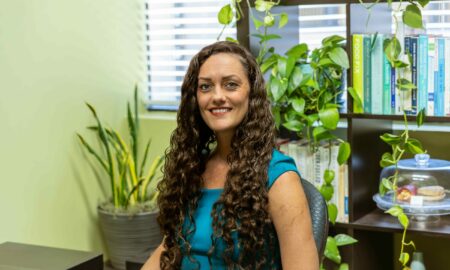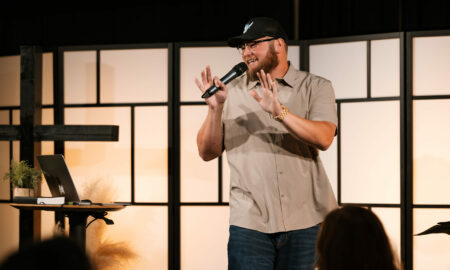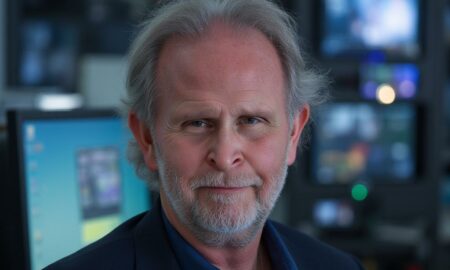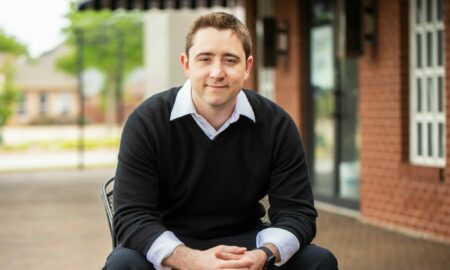

Today we’d like to introduce you to Rebekah Carlile.
Thanks for sharing your story with us Rebekah. So, let’s start at the beginning and we can move on from there.
Many moons ago, I earned a B.A. in Drama from the University of Texas at Austin. I loved theater but was probably better at writing plays and sewing costumes than acting. I also couldn’t find a job. All my friends had moved to NYC to “make it,” so I did the only thing I was sure I could do: go to school. I promptly went back to UT for a Master’s degree. Over 25 years later, I still think it’s one of the best decisions I ever made. I have loved being a speech-language pathologist and helping people of all ages communicate better, especially children.
Fast forward about 15 years, and I am living in Fort Worth with my husband and three young kids on this magical street where neighborhood kids ran barefoot across front yards, and lemonade stands and tree climbing were the regular. In the summers, we started hosting what we called “Backyard Theater.” I would take one of our favorite children’s books and adapt the narrative to a play. Over the course of a week or two, we cast parts, painted backdrops, built make-shift sets, and pulled together costumes. Kids of all ages and abilities participated. For the big finale, neighbors brought lawn chairs, we served drinks and snacks, and the kids performed everything from Judy Blume to Kate DiCamillo. I was hooked.
I couldn’t stop thinking about all the language, reading and social skills we were building while we were having so much fun in the backyard. The kids were solving set design problems together, sharing different ideas and finding common ground, and doing a lot of reading! My two sons, Sam and Lucas, were the oldest of the bunch at the time, and I especially loved watching them paint props and run lines with our younger neighborhood friends. Age began not to matter so much after a couple of days. The kids were probably learning more from one another than they were from me. I wanted more kids to have a Backyard Theater experience.
I finally decided that I needed research. I needed to know if there was really anything to what I thought was happening in my backyard. I had struggled before with the idea of going back to school. I was afraid of being away from my kids too much, but then I came across what was then a new program at UTA.
Two nights a week for the next two years, I drove to Arlington to take classes towards a Masters of Education in Mind, Brain, and Education (MBE). It was rough on my kids, especially my daughter, Alice. I’m pretty sure she cried every night I couldn’t tuck her in. I had a lot of momma guilt, but I knew I’d regret it if I quit.
The program was all about how current thinking in psychology and cognitive science informs us about how kids learn best. One of the biggest take-aways was the idea of feedback. When I was a kid in school, teacher feedback always meant a few days later, a red ink pen, and a grade. I rarely got the chance to revise or revisit the questions I’d gotten wrong, just the chance to study harder next time, with the next chapter in the textbook. Thinking back, I was just memorizing instead of really learning.
It was a true “lightbulb” moment for me when I understood how much better learning could be if feedback were built into the activity itself, happened immediately, and students were motivated to revise on their own. Think about drawing a bath. You have a goal: to fill the tub. You know what to do: turn the hot and cold handles. You get immediate feedback: the water feels too hot or too cold. You revise: add more hot or cold water. This was like what we were doing in Backyard Theater, kind of accidentally! We had a goal: to put on a play. We knew what to do: learn lines, figure out which side of the stage to enter from and how to design the set. We got immediate feedback: oops, all the actors are on one side of the stage, or we can’t hear what Kacy is saying. We revised: had actors come in from stage left instead, and Kacy spoke louder.
With the help of Dr. Marc Schwartz, the Director of the MBE program at the time, I designed a program to build communication skills for telling and understanding stories through playwriting, all built on the research and models from cognitive science I had geeked out over for the past two years. I ran a pilot of the program at Cook Children’s Hospital with a group of outpatient children and ending up winning the Provost’s Award for graduate research in 2015.
Now I had a program, and absolutely no idea what to do next. I was still doing speech therapy and was working with a little girl named Jenna. Her Mom, Leigh, and I became fast friends. Leigh is one of the best people I know. She’s smart and genuine and a tireless advocate for children, hers and others. When Leigh agreed to help me try to take my program into schools, I knew we had something.
We took a deep breath and made an appointment with Dr. Marilyn Tolbert, who was then the Director of Laboratory Schools at TCU, including the Starpoint School for children with learning disabilities. We pitched our idea to bring Story Stage to her students, showed her the results from my pilot program at Cook Children’s, and walked out with a contract for all grade levels for the upcoming school year. We couldn’t believe it.
This Fall will be our 5th year at Starpoint. It has been the most wonderful partnership we could ever have imagined. We’ve now brought Story Stage to several other area schools, including Trinity Valley School, Key School, Hill School, and Fort Worth Academy.
In February this year, we decided to spend money on a professionally built website. We’d never spent a dime on marketing and decided the time was right. This was partly because we’d just presented at the American Speech-Language-Hearing Association’s National Convention in Orlando. In preparation for the convention, we had developed products and launched them successfully while we were there. We needed a better website to continue product development and drive sales.
The website was about halfway done when COVID-19 closed schools. We had a brief conversation about the possibility of losing all of our school contracts but spent the first week in complete denial. Then suddenly, like everyone else, our kids were home from school and it didn’t look like they were going back anytime soon. We were terrified. We really might lose our business.
Fortunately, we rallied. We worked day and night to build an engaging way to host Story Stage groups online. We reached out to our schools and saved all but one contract. We were even able to “stage” the students’ end-of-semester plays virtually! It was actually kind of fun! Many of our student actors who are now performing in NYC, we’re able to “return” and act in our virtual shows.
Today we are optimistic. Our new website has launched, and we have found that many of our games and activities work quite well online. Now, we can even make our Story Stage Playwriting Workshops available to students anywhere in the world with confidence. We are also booking speaking engagements steadily. Next month we are looking forward to a virtual event with the team at City Sounds NYC about using theater to teach social inferencing to their students. We are fortunate. We are growing in new directions, in spite of or because of COVID.
Overall, has it been relatively smooth? If not, what were some of the struggles along the way?
In some ways, yes. I cannot imagine a better business partner than Leigh. We share the same values and work ethic, and we listen to one another when we (rarely) disagree. We are also super lucky to both have very supportive husbands. At the end of each school semester, we stage shows at each school. We hire college and professional actors to perform the plays that our students have written. So right before Christmas, and right before the end of school, we are swamped! We absolutely could not do it without our families picking up the slack with our own kids during our “Show Seasons.”
Our biggest struggle has been deciding how to scale. Our initial plan was to get Story Stage into as many schools as possible by hiring and training more Story Stage teachers. That has proven difficult and not much fun! We don’t really have the budget to hire and train teachers the way we wanted to, and neither one of us wants to travel and be away from our families more. We’ve had some opportunities in nearby towns, but have had to turn them down because we felt spread so thin.
We also struggled for a while to figure out who our real market was. We were conflicted. We knew that Story Stage could help students who learn differently, like those who were struggling with language disorders, auditory processing, social communication, or writing. But what about the kids who just needed a voice? Those who wanted to be in theater, but weren’t drawn to acting? The shy kid? Or that kid that just needed a creative outlet, or a group outside of school to make new friends? We felt like Story Stage had something for all of them! And that made it darn near impossible to come up with an “elevator speech.” People would ask, “So, what is Story Stage?” And Leigh and I would look at each other, like, “Your turn.”
In the end, we just want to bring Story Stage to the students who need it for whatever the reason. That’s a big part of what we are still working on. Many times, the students who would benefit the most from Story Stage, are the ones who cannot afford it. One solution would be getting the Story Stage program into the public schools. We’ve tried with Arlington, Fort Worth, and Crowley ISDs. The main problem seems to come down to funding. We don’t fit neatly into any of the “funding boxes.” We aren’t therapy; we aren’t an extracurricular; we aren’t theater, and schools tend to view running our program as part of their language arts curriculum as a sacrifice of instructional time.
Story Stage – what should we know? What do you guys do best? What sets you apart from the competition?
Ha! So here goes the new elevator speech! “Story Stage provides games and activities, lesson plans, and curriculums using progressive research on how kids learn best. Our programs and products help students build better conversations and stronger academics.”
Research tells us that students who have strong narrative language skills (the ability to tell and understand a good, cohesive story) have better academic outcomes across subject areas. We build those skills. Students who can tell a good story also typically have good social skills and are able to do things like enter a conversation, extend a conversation, and read body language with ease. We build those skills too. Story Stage products are active and collaborative and rich in feedback. In our semester-based programs, students build plays orally, from their own ideas, and see their works performed by skilled actors in a Fall or Spring show.
We are probably best known for two things: 1) giving students an interactive framework for oral storytelling and writing so that they can write plays (especially those who never thought they would or could); and 2) creating a fun, natural, safe space for children to practice a language or social skills. What sets us apart is that we prioritize teaching playwriting to children rather than acting.
Dr. Harry Parker, Chair of the Department of Theater at TCU, said about our program: “I don’t know anybody that’s come up with exactly this idea to have these young student writers get to work with seasoned, professional adults to realize their shows. They understand that what they are doing is making an impact on these young writers. My favorite moment is when the performance is over and you see the young writers go and thank the adult actors, with sometimes sort of a sense of awe, “Wow, I didn’t know my play was that good, thanks!” Professional actors who perform in children’s theater shows often have that moment when an audience member says, “Oh, I loved the play so much.” But think about how much more powerful this is because the children wrote the play. “Thank you for performing MY story, for breathing life into MY characters.” That’s a profound moment and a moment of collaboration… a young person and an adult who’ve worked together as a team to make a piece of art.”
As a company, we are proud of the reputation and trust we’ve built in our community. Many of our referrals come from teachers, school counselors, psychologists, and educational diagnosticians. We are proud that so many professionals look to us to fill a need for the kids they see.
Any shoutouts? Who else deserves credit in this story – who has played a meaningful role?
I think Leigh and I would agree that our families have been our biggest cheerleaders. They’ve put up with lots of late nights, built things, researched things, helped us keep up with things, and even worn a costume or two in a pinch!
My dear friends and neighbors without whom Backyard Theater would never have happened: Beth Finley, Dawn Howell, Linda Clyma, Anjie Bulter, Amy Brown and Holly Shipman.
Dr. Marc Schwartz, who was my mentor in the Mind, Brain, and Education program at UTA, helped my frame my ideas in a way that finally made sense. I would’ve never been able to pilot the program at Cook Children’s without him.
Dr. Marilyn Tolbert, who took a chance on Story Stage in our very early days, and all the wonderful teachers at Starpoint, we’ve had the privilege to collaborate with and learn from.
Jovane Caamano and Madi Calhoun, our very first hires, who have certainly worn all the hats you can wear at Story Stage. We were lucky enough to hire them as actors when they were still TCU Theater students.
Dr. Harry Parker, whose encouragement and honesty have meant the world.
Pricing:
- Games, activities, and lesson plans for Parents, Teachers, and Therapists in our online shop starting at just $5.00.
Contact Info:
- Address: 2120 Mistletoe Blvd., Suite 1
Fort Worth, TX 76110 - Website: www.story-stage.com
- Phone: 817-989-6399
- Email: rebekah@story-stage.com or leigh@story-stage.com
- Instagram: www.instagram.com/storystagefw
- Facebook: www.facebook.com/StoryStageFortWorth
- Twitter: www.twitter.com/storystageftw

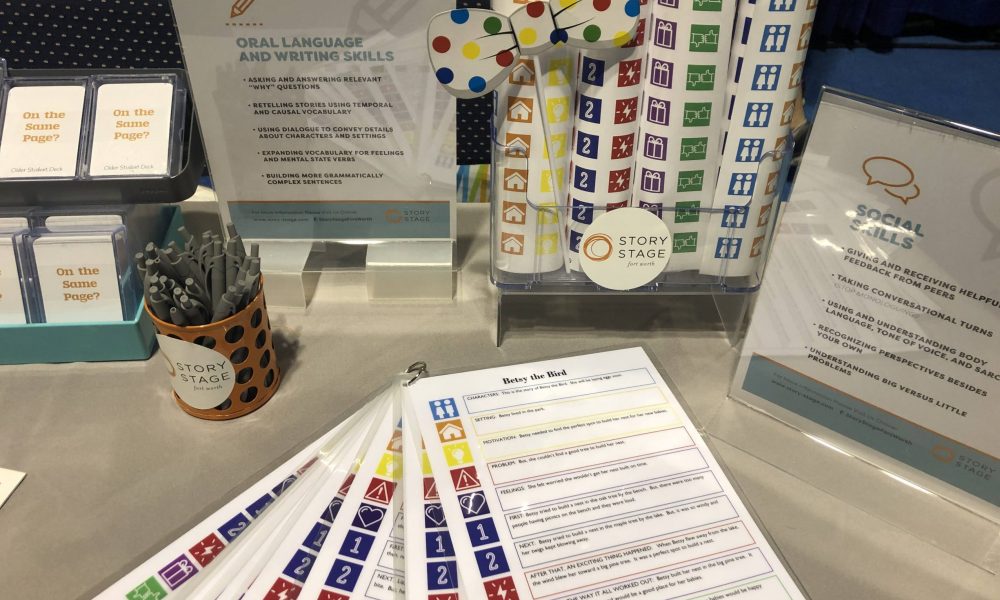








Suggest a story: VoyageDallas is built on recommendations from the community; it’s how we uncover hidden gems, so if you or someone you know deserves recognition please let us know here.












